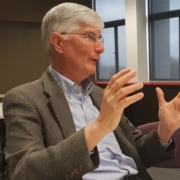For the next three shows, Rolf Straubhaar will be interviewing the winners of the globalization and education Special Interest Group’s inaugural book award.
In today’s show, Rolf speaks with Irv Epstein, the first of two honorable mentions in the book award. Irv is a Professor of Peace and Social Justice at Illinois Wesleyan University where he directs its Center for Human Rights and Social Justice and chairs the Department of Educational Studies. His latest edited volume is entitled: The Whole World is Texting Youth Protest in the Information Age.
Citation: Epstein, Irv, interview with Will Brehm, FreshEd, 22, podcast audio, April 4, 2016. https://freshedpodcast.com/irvepstein/
Rolf Straubhaar 0:49
Irv Epstein, welcome to FreshEd.
Irv Epstein 0:51
Great.
Rolf Straubhaar 0:51
How did you become interested in this subject in terms of youth protest and social media? And what really brought you to this?
Irv Epstein 0:59
Well, I have had a long-lasting interest in social movements and in youth protests. You know, I’m a child of the 60’s and early 70’s. And as an undergraduate, I wrote a senior thesis on the May 1968 student demonstrations. And after a number of years, I thought it would be useful to go back and look again at that kind of literature and what had changed. And certainly, I was captivated by the global protests that occurred from 2011 to 2013 in particular. And in doing that, of course, the use of social media was a new phenomenon that had to be taken account of. So, this was a chance to reprise long lasting interests and to update my understanding of the literature which had changed quite a bit since my initial explorations of the topic.
Rolf Straubhaar 2:11
That gets into another question I was going to have, which is especially in the introduction, you frame this very much in relation to the protests of the late 60’s. And it sounds like so that was an early research interest for you in your career?
Irv Epstein 2:24
Yes.
Rolf Straubhaar 2:25
And why do you feel that’s a productive comparison between, say, the movements of then and now?
Irv Epstein 2:33
Well, I think the questions arise as to the importance of protest and social movement protest, and how you measure that importance. And I think for a number of us who were involved in youth protests growing up, we wrestle with that kind of question or those issues all the time. There is a tendency, on the one hand, to be self-congratulatory. And on the other hand, we look at the world years later and the lack of progress that, given the idealism that was expressed at the time and look back with some remorse and regret. So, on a personal basis, these are issues that are always going to be with us. But what I noticed is that the same kinds of questions that arose in the 60’s arise when looking at more contemporary protests. As to whether or not they’re effective, whether or not they touched upon a wide group of interests, or a narrow group of interests, whether the possibilities for engaging in lasting political and social change how one, in fact, decides whether a protest movement is successful. And so, I think that those comparisons are quite important and useful.
And then there are the differences that are really important. And the major difference is that in the 60’s, although there were global protests certainly in 1968, they were framed within the context of the nation state. And whereas we were aware of what was happening in other countries and other places and locations, the fluidity and the ease with which one could be aware of what was happening in other places, it was somewhat restricted. And then the possibility of ideas influencing directly mass behavior were somewhat limited. And I’ll give an example of that. I’ve been thinking about this. And both in the 60’s and more recently, there were a number of performative rituals and acts that youth participated in which showed their idealism, perhaps some naivete, and a way of challenging the system but in a non-confrontational way. So, one of the incidents in the 60’s, which was quite famous, was protest leader, Jerry Rubin, went to the New York Stock Exchange, and went to the top of the top floor, and then threw out dollar bills on the floor of the exchange. And so, all of the traders stopped what they were doing, gathered the dollar bills, and he basically stopped the stock exchange from operating, right? So, that was a kind of performative act, which was inventive. And it was a way of really mocking what he saw was a capitalist system. Well, if you can imagine what would happen if such an act occurred in contemporary terms, and was broadcast through YouTube, or with a global audience. It would go viral, the audience would be expanded exponentially, and the context and the meaning of what that meant would be discussed amongst multiple groups in ways that could not happen in the 60’s. So, that’s how I see the similarities and some of the differences between looking at protests in the 60’s and in the 21st century.
Rolf Straubhaar 6:56
And then specifically in the book, and even in the title, you focus to a certain degree on new media and social media’s role in that. Do you also feel that the role of the traditional media has changed in response to that? Like, into how we respond to protest events?
Irv Epstein 7:15
Well, that’s a great question. I think it has. One of the points, which is made in a number of chapters is that, the social media has substituted for traditional media, particularly in authoritarian situations where regimes are more able to control old media. And so, whether it be in the Russian case, or in the Chinese case, or in the Bahraini in case, or other cases, you find social media being used as a way of conducting watchdog journalism in netizenship, forming new senses to what it means to be a citizen because traditional forms of expression and reaction to communication of ideas through old media are just not available. So, in some ways, in some contexts, the social media has replaced traditional media and in other situations, it’s supplemented it, but it’s not replaced it. So, it sort of depends on the context.
Rolf Straubhaar 8:34
And you’re already jumping into a bit, I think, some of the particular contributions in particular chapters. Could you explore a bit, or just explain for the listeners, how the contributors to this volume came together?
Irv Epstein 8:52
Yes. So, basically, what happened was that I wrote one of the chapters after giving a presentation at the World Congress of Comparative Education Societies, in Buenos Aires. And that was a chapter that compared basically youth protests in Chile, Spain, and looked a little bit at the Occupy Movement in the United States. I met colleagues at the World Congress, and we talked about expanding this idea into an edited volume. And then I also had a number of colleagues whom I knew were area studies experts with general interests in the field whom I contacted. And then there were others whose work I had read, who I contacted and some of them were available, some of them recommended other scholars and so it’s just a combination of people who had similar interests and were available to participate.
Rolf Straubhaar 10:11
And just because a lot of our listeners might be more junior scholars, people that are still in grad school, can you explain a bit of the process of how you went about securing a contract with a book. At what point that happened in the process? And whether you got a bunch of contributors before putting it out to various presses? Just because that can tend to be a black box for people that haven’t gone through that process before.
Irv Epstein 10:37
Yes. That’s a great question. So, I contacted people before securing a contract. And as part of the process of creating a proposal, one gives a chapter-by-chapter outline. One includes a sample chapter. And one also includes the affiliations of the various contributors. Now there were some contributors who were wondering, “Well, has a contract been secured? Am I going to devote time to this without there being a contract that’s been secured”? So, it can be a chicken and egg situation but generally, the commitments are there. And then depending upon the publisher, you send this out. And in this case, I really wanted to go with the University of Pittsburgh Studies in Comparative Education series because there were university reviewers that would look at the proposal. And then that came through, and then we have had about a year or so to get everything together. So, that’s basically how that happened.
Rolf Straubhaar 12:23
Thanks. That’s interesting and insightful. I’d love to get a bit more into your contribution as an editor. Specifically, in your introduction, you go to great lengths to discuss how, unfortunately, often globalization and neoliberalism can often be conflated. Like we talk about them as if globalization only happens within the framework of neoliberalism. Then you go on to differentiate what defines both terms to frame the book. Can you explain a bit of that here? And how you differentiate between those terms and why you feel that’s important?
Irv Epstein 12:58
Sure. So, I see neoliberalism as being an important part of globalization, but it is a more limited part. So, when we think of globalization, the kinds of characteristics I refer to include differentiating notions of time whereas flux becomes more significant than necessarily linearity, where knowledge production is explosive and instantaneous as opposed to canonical, where ethnicity is transnational rather than fixed. And within all of those processes, there are certainly many neoliberal agendas and by neoliberalism, I think we’re referring specifically to systems which, on the one hand, promote risk generated through financial investment rather than through traditional forms of economic production, promotion of the structural adjustment policies where the market economy is promoted but with state interference, and the artificial inducement of competition on unequal terms. So, those things are part of globalization but they’re not the only parts of globalization. So, I would say, first of all neoliberal agendas occurred prior to an understanding of globalization processes. They were most evident with Thatcherism in the 70’s and occurred with government in the United States with the bailout of New York City under Draconian terms under which New York City was bailed out in the 70’s. But globalization also involves newer forms of empire building and neocolonialism certainly after the Iraq War. And so, that has to be part of the equation also. And all of that is part of what we would consider to be globalization. But if we narrow our terms of discussion to simply neoliberalism, I think something is lost. And what is lost is the fact that globalization challenges traditional notions of institutionalism and modernity. And with regard to schooling and schooling processes, particularly, globalization asks us, in looking at the ways in which ideas flow and change, to think of education as being a more fluid concept. Not limited to state sponsored schools, or the relationship of the state to education per se. So, it’s actually asking us to expand our understanding of what education is and means, and therefore I find it useful to make that distinction.
Rolf Straubhaar 16:45
And we see that explored in a couple of the chapters where there isn’t necessarily a discussion of formal schooling per se, but of education in a broader sense.
Irv Epstein 16:58
Right, right.
Rolf Straubhaar 16:59
Just to give anyone who’s only hearing about the book for the first time here a taste, could you give just a few examples of perhaps what aspects of this broader trend are addressed in some of the various chapters?
Irv Epstein 17:14
Sure. So, what the chapters do is that they look at both social movements and forms of youth protests in a number of different contexts. So, there is a chapter that looks at the Gezi Park demonstrations in Turkey as an example of protest directly against the neoliberal state. This was a space, Gezi Park, which was a public space, which was going to be used by developers with the assistance of the state for a building of a shopping center. And that symbolic intrusion into the public space created a widespread dissent, really, with regard to the authoritarian nature of the state. And so that chapter really looks at that social movement within the context of the way in which an attack on neoliberalism is framed through opposition to an authoritarian regime. Similarly, there are chapters that look at Iran and look at Bahrain with regard to the use of the social media, as I said before, as spaces for contesting the regime’s authoritarianism -many of which are not immediately successful. But at least in the context of Iran, the results of the Green Revolution, years later, results in a voting out of power of hardline conservatives. In both of those cases, you see, the governments, let’s say, being caught off guard with regard to the use of social media. And then they come back and then create their own alternatives to try to repress it. There is a chapter on the Pussy Riot band controversy in Russia. And there are again, the internet is the social space for argumentation and discussion of ideas which would not be allowed publicly in formal spaces. And then there is the chapter that I referred to before that looks at Chilean student demonstrations with regard to education inequality and financing as an exemplar of the corrupt neoliberal state, where students used the traditional mechanisms of organization to rally widespread support against the government. Compared with the Spanish case, the Indignados Movement, which was more I would say, grassroots, a little bit more anarchic in terms of lack of formal leadership, and very social media driven. And then the Occupy Movement in the United States is used as a kind of comparison between the two, where there are characteristics of both of those examples that are implied. And there are other chapters too. The one I want to mention, which I think is important, is the chapter on South Africa, and a shack dwellers movement in South Africa. And there the argument which is made is that the digital divide is so great that people who are really poor, who have had the experience of organizing, don’t use a social media. They don’t have access to it. And so, the possibility of social media being used for widespread, let’s say, demonstration in a positive way does not occur in the South African case. So, I think from those examples, and there are others, too, but I think from those examples, I hope that the book does a fair job in looking at both the limits and possibilities of organizing in the 21st century and takes, hopefully, a relatively objective view with regard to the importance of what’s happened recently on a global scale.
Rolf Straubhaar 22:08
Yeah. Following up on that, one thing that we discussed a bit within the award committee, just because it’s become such a topic of discussion, especially following the Arab Spring and Occupy in the traditional media, is that among some social movement theorists, there can be a worry that the importance of social media can be overhyped to a certain degree. What are your thoughts?
Irv Epstein 22:33
Yeah. I think so. There are contrasting views. The argument, which I found most compelling is the argument in favor of the importance of social media, is that generated by sociologist Manuel Castells, who in looking at the Arab Spring, as well as Spain, sees that there are differences in social organization and in the ways in which people relate to one another as a result of mimicking the networking function of social media. The lack of authoritarianism or leadership, or discrete leaders, for instance, the lack of political organizations, such as formal student unions or student groups directing from top-down courses of action. And Castells argues, in addition, that it’s through the social media that people see that their friends are going to go demonstrate. So, the act of demonstrating and physically going out and participating in a demonstration doesn’t become so onerous. There are people who are going to, in fact, be with you. And you realize also, of course, that there’s a larger audience that is going to witness and see what, in fact, you do. All that has a positive effect. The other argument is that social media creates cleavages so that who you contact, or who your Facebook friends are, who you’re blogging with and looking at are basically people of the same group that you identify with. And so, there is a notion of identity salience, the way in which you see your own role as an active member of a social movement broadening or changing. And there is dispute as to whether social media, in fact, encourages broader participation or limits it. And I think in terms of the cases for this book, it’s mixed. You don’t see social media necessarily dramatically changing permanently social relationships. But on the other hand, you see that it has an effect. So, in the case of Cambodia, for example, where the traditional media are severely controlled by the government, 200,000 people come out for an opposition leaders rally, which could not have happened, except because of the use of social media. So, I think that the jury is out. Like, all sorts of items and things, social media is an important tool, but I wouldn’t say that it has, let’s say, permanently changed the ways in which people organize, the way they get together, and the nature of their social relationships. But that might be a gradual thing that’s happening through time.
Rolf Straubhaar 26:08
Great. Well, thanks so much for taking a few minutes to talk to us. For any listeners that want to check out the volume again, is The Whole World is Texting: Youth Protest in the Information Age, edited by Irving Epstein. It’s been out from Sense Publishers. The series it’s a part of is Pittsburgh Studies in Comparative and International Education, a series edited by John Weidman and W. James Jacob from University of Pittsburgh. Irv, thanks so much for spending some time with us today.
Irv Epstein 26:39
Thank you.
Coming soon.
Coming soon.








